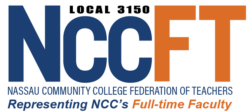Cynthia Eaton, an English professor and leader in the Faculty Association of Suffolk Community College, has a regular technology column in the AFT magazine On Campus. While her columns are always thought- provoking and insightful, this month’s column caught my attention because it focuses on one of the most important aspects of redesigning our on campus courses for online settings. Most noteworthy in her essay is her insistence on pedagogy first. She makes it clear from the start that when higher education faculty think about moving into the online world that they should retain all of their good, sound pedagogical practices and that the goal is to use the technology to facilitate those practices.
Professor Eaton pushes for faculty to “reflect on what [we] do, and how and why [we] do it.” Using the cognitive psychology concept of “affordances” she encourages us to reflect on what we want our students to learn or do and then use the online tools that will afford our students the ability to do those things. She then uses examples from her own teaching of a course entitled “The Art of Poetry” to illustrate how the entire process works. Her online students use the tools she’s provided to post their poems and do group work. The technology facilitates the teaching and learning goals rather than driving them.
Having taught my own online classes recently at NCC, I can attest to the lure, like the song of the sirens, of using the technology first and thinking about my own pedagogical practices later. But I am happy to report that I did stick to my best practices approach that I use regularly in my face-to-face classes, and it has paid off.
The NCCFT is keeping a close eye on distance education at NCC; the issues discussed here by Professor Eaton are relevant to our campus in that SCC and NCC share many of the same kinds of students and campus technology issues.
Click here to download and read her article (PDF) or look for it in your mailbox soon!
-Mike Anzelone, NCCFT Secretary

